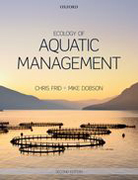
Offers a holistic overview of the exploitation and management of marine and freshwater systems from an ecological perspective. Considers how ecological principles can be used to inform effective and sustainable management of the consequences of human interactions. Covers a range of ecological responses in systems as a result of human activity, from fisheries to recreation. Provides case studies and references to enable students to study individual topics in more depth. An Online Resource Centre provides additional resources, enhancing the educational value of the book. New to this edition An increased number of case studies bring context to the subjects being discussed, and illuminate the methodological aspects of aquatic management. A new chapter on the dynamics of aquatic systems highlights the challenges faced in monitoring systems and establishing causality. Ecological restoration schemes are considered in a new chapter, which looks at some of the successes and failures of large-scale manipulation of ecosystems. Coverage of certain topics, including non-native invasive species, management tools, and the valuation of ecological goods and services, has been enhanced. Marine and freshwater systems are being placed under pressure like never before. A bigger and more demanding human population has meant increased utilisation of aquatic systems and, as such, the need for sustainable solutions to allow the development and conservation of these systems has become an international priority. In order to understand the limits of exploitation, an understanding is needed of the ecological principles that constrain levels of productivity and the systems' responses to exploitation pressure. This timely book explores current exploitation practices, and the ecological basis and consequences of that exploitation. From a consideration of the ecological effects of the extraction of non-living resources, including energy and water itself, it progresses to the biology and ecology of aquatic organisms, and how these underpin the harvesting for aquatic resources. A discussion of the ecological consequences for the system of its use as a means of transport and as a repository for wastes follows, along with the increasing importance of aquatic systems for human recreational pursuits. Finally, effective management strategies for natural hazards, the provision of ecological goods and services, and restoration of aquatic systems are considered, as well as the importance of ecological science in exploitation management. The role of science in providing an understanding of the effects of human intervention in aquatic systems is emphasised throughout, along with a consideration of the role of ecology in the sustainable management of the consequences of human activity. Online Resource Centre The Online Resource Centre to accompany Ecology of Aquatic Management features: For students: · Library of web links, giving students quick access to a range of additional resources · Topical updates - surveys of key developments in the field For lecturers: · Figures Readership: Undergraduates and Masters students taking courses in aquatic biology, aquatic ecology, environmental science, environmental management, water resource management, and introductory courses in fisheries and aquaculture.
- ISBN: 978-0-19-969329-0
- Editorial: OXFORD UNIVERSITY PRESS.
- Encuadernacion: Rústica
- Páginas: 352
- Fecha Publicación: 13/06/2013
- Nº Volúmenes: 1
- Idioma:
